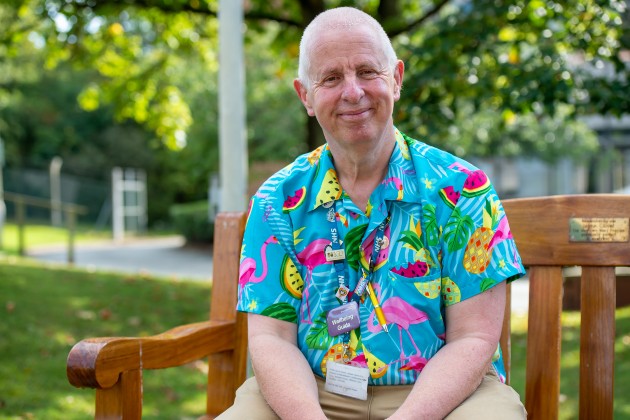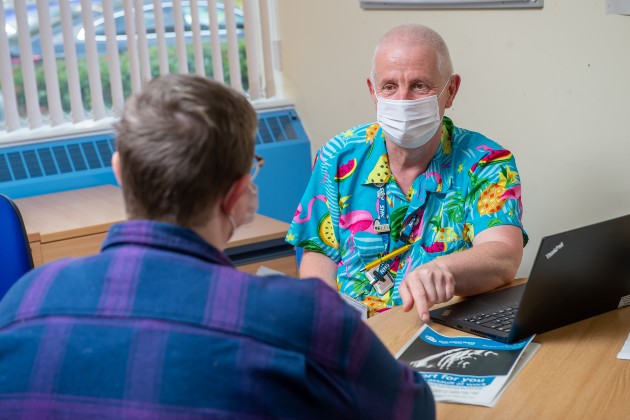When RCN steward Phil Noyes was unable to secure the help a member needed, he vowed never to be in that position again.
“All they wanted was a bit of financial support towards travel and prescription costs for treating a long-term condition caused sometime before, during an incident with a patient,” Phil recalls.
“But as it had happened more than three years ago, they were out of time for both criminal and personal injury compensation. That’s the last time I want anyone not to have that information readily available, so they could have acted sooner.”
Putting it into action
Two years ago, Phil, who is Staff Side Chair for Coventry and Warwickshire Partnership Trust, began creating an information leaflet to help staff who have been assaulted at work. “I told the member they’d inspired me to do it,” he says.
This summer, it has finally been accepted as part of the trust’s policy on coping with stressful incidents, with staff able to read it on their intranet.
“A lot of information in the leaflet is pretty well known by those who are working as union reps or in human resources, but for many managers and staff, it’s a really uncertain area,” says Phil.
Verbal assaults can also have a deep impact
“As members of a caring profession, people can often be reluctant to pursue compensation associated with the word ‘criminal’ as they don’t like that label. But it enables them to get recompense for injuries that can affect their whole life, in some cases causing them to give up their careers.”
Sections include finding support in your team and within the trust; absence from work after an incident and returning; police involvement; and the various types of compensation.
“Being assaulted at work by someone you are caring for is not part of your job, even though the risk may be a known one. It may take some time to come to terms with what has happened,” says the leaflet.
Sometimes recognising the lingering psychological effects can be slower, Phil believes.
“Verbal assaults can also be dismissed as ‘it’s only words’,” he says. “But they can have a deep impact.”
Finding help
Sources of recommended support include the trust’s own counselling service or a peer-support approach for the emotional wellbeing of staff who’ve experienced a traumatic event at work.
“You might also be asked to be part of a review of what happened so that services can learn and make changes to try to avoid it happening again,” the leaflet says.
Feedback so far has been very positive, says Phil. “It’s taken a long time to get here, but I think it’s been worth it in the end. There have been a few roadblocks along the way, but a lot of key people have really helped me to get through those.”

Tips to create your own resources
- Choose something where there is a knowledge gap.
- Be prepared to persevere. “Don’t give up,” says Phil. “And don’t underestimate the amount of work involved. It takes a lot of effort.”
- Seek out support from across your organisation. “Find your natural allies – those who feel as concerned about an issue as you do,” Phil advises. “As stubborn as I am, I’m not sure I would have managed to see this through to the end without that support.”
- Seek feedback along the way, from different audiences. “I’m so grateful to all of those who made useful comments, including suggestions about what it should include and different ways of wording things,” says Phil.
Compensation claims
There are a number of ways to claim for compensation following an assault at work:
- the Criminal Injury Compensation Authority is an organisation that was created to compensate the blameless victims of violent crime. This body will compensate victims of crime even if no charges have been brought (as long as it’s been reported to the police). The claim window is open two years from the incident date
- you can make a claim via the courts directly from your assailant, provided you tell the police this is what you want. Personal injury claims apply where an employer has been negligent of your safety, and can be made within three years of the incident
- RCN members are eligible for legal advice and representation for injuries sustained due to the fault of someone else. Whether a workplace injury or not, RCN Law's personal injury specialists can help you obtain 100% of your compensation. The service is completely free to members, regardless of whether the claim is successful.
Information and resources
Nursing staff encounter a range of potential hazards, often on a daily basis, but few are as distressing and difficult to manage as violence.
You have a right to be safe at work irrespective of whether you are based in hospitals, in the community or other healthcare premises. Employers are required by law to identify hazards to which staff are exposed and take all reasonably practicable steps to eradicate or minimise them.
We have updated our RCN advice guide on violence in the workplace, which covers scenarios such as verbal abuse, sexual harassment and assault, and your employer's duty of care. You can read more about it here.
For confidential help and support please call 0800 783 1157 (open every day of the week, 24 hours a day). Further information can be found here.








